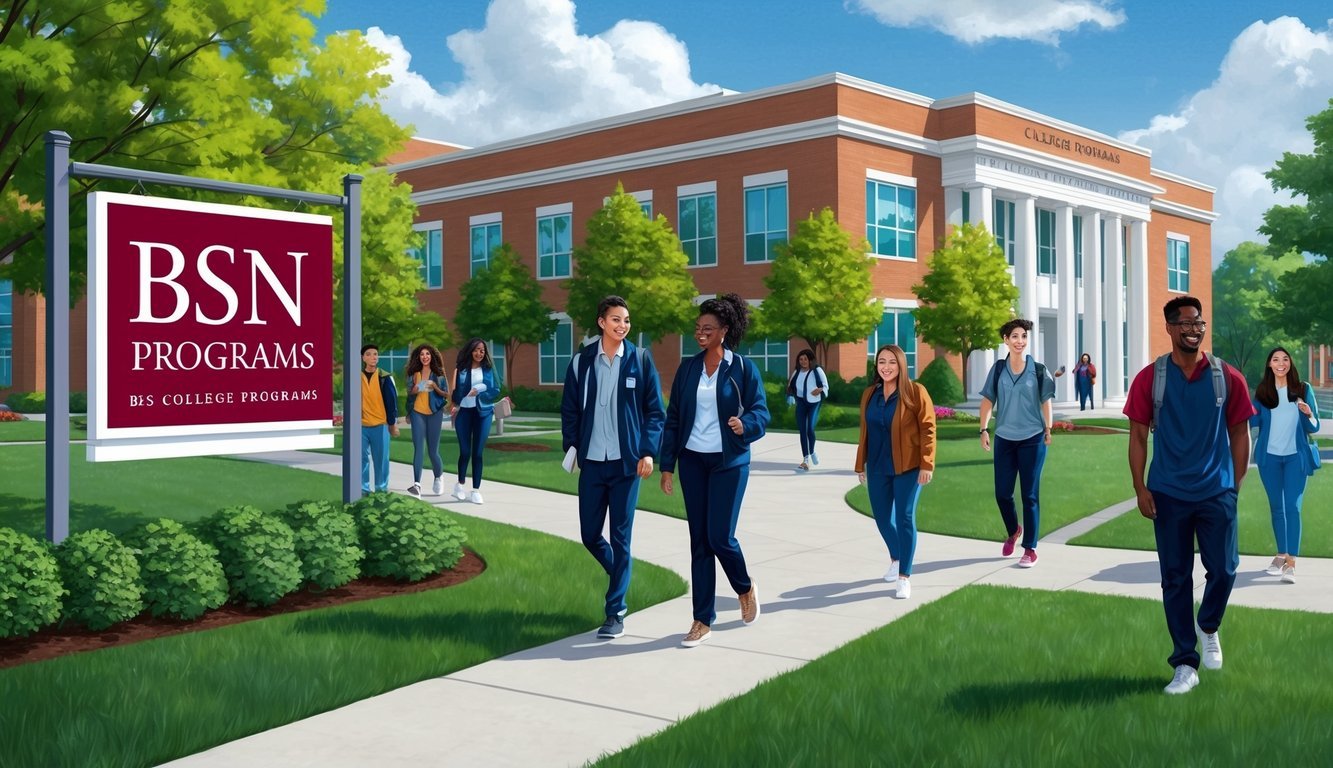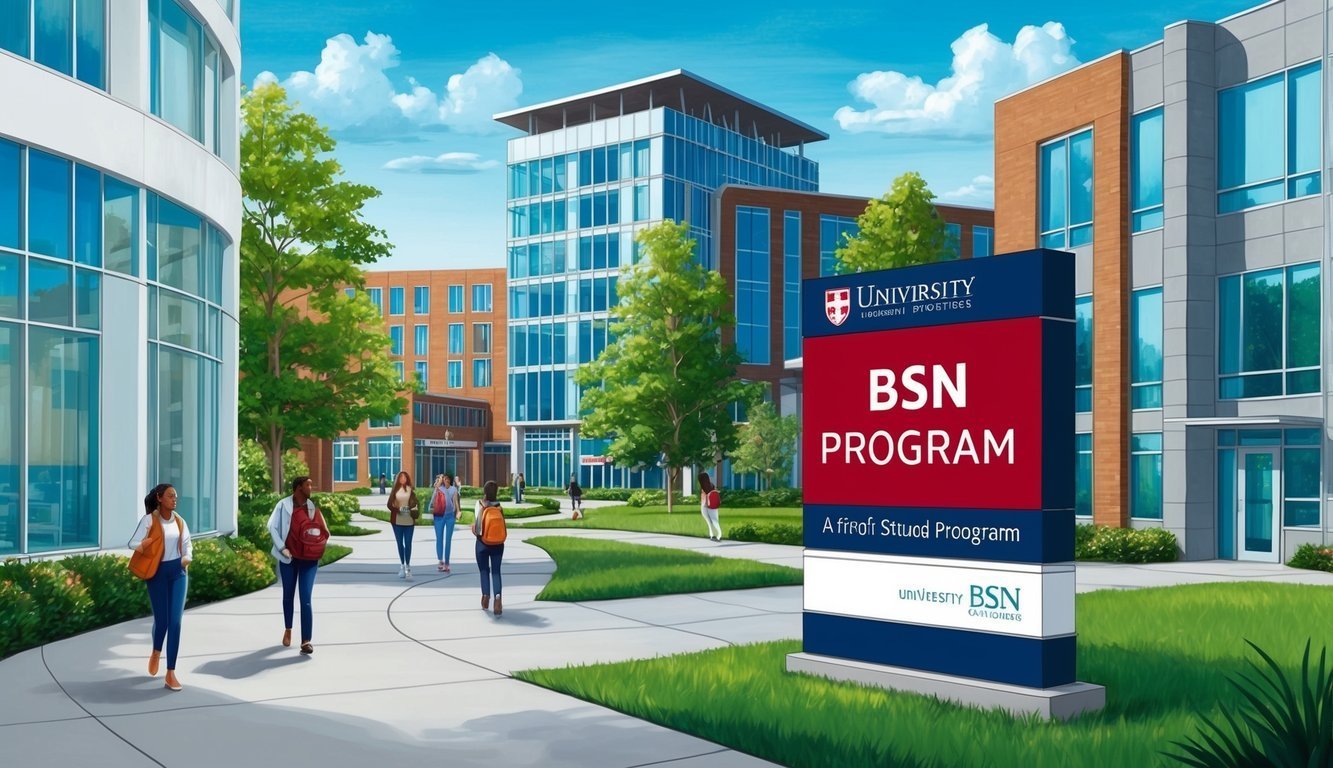Looking for a BSN program near you? You’re not alone.
Many aspiring nurses are eager to advance their education and career with a Bachelor of Science in Nursing. You can find numerous programs at colleges and universities across the country.
Nursing schools typically offer both traditional and online options, providing flexibility for busy students.
Whether you prefer hands-on learning in clinical settings or the convenience of online classes, there’s a program that can meet your needs.
Exploring different BSN programs can help you understand admission requirements, curricula, and any financial considerations you should keep in mind.
Exploring BSN Programs

When considering a Bachelor of Science in Nursing (BSN) program, you will encounter various types and essential accreditation standards.
Types of BSN Programs
There are several types of BSN programs available to fit different educational backgrounds and schedules.
Here are the common options:
-
Traditional BSN: This is typically a four-year program for students with no prior nursing education. It includes classroom instruction and clinical practice.
-
Accelerated BSN: Designed for individuals who already hold a bachelor’s degree in another field. These programs usually last 12 to 18 months and focus on fast-tracking your nursing education.
-
RN to BSN: This program is for registered nurses who want to advance their education. It allows you to earn your BSN while building on your existing knowledge and skills.
Each of these programs prepares you for the NCLEX-RN exam and helps you earn a nursing degree.
Accreditation Standards
Choosing an accredited nursing school program is crucial for ensuring a quality education.
The two main accrediting bodies are:
-
Commission on Collegiate Nursing Education (CCNE): Focuses on baccalaureate and graduate nursing programs. Graduating from a CCNE-accredited program can improve job prospects and eligibility for advanced studies.
-
Accreditation Commission for Education in Nursing (ACEN): This also accredits nursing programs but covers a wider range, including practical and associate degrees.
Before enrolling, verify that your chosen program is accredited.
This can affect your ability to sit for the NCLEX-RN and your future career opportunities.
For a list of accredited programs, visit resources like Nurse.org.
Admission Requirements
When looking into a BSN program, it’s essential to understand the admission requirements.
This section outlines the prerequisites you need as well as the application components involved in the process.
Prerequisites and Documentation
Before applying to a BSN program, you must complete specific prerequisite courses.
Typically, programs require around 45 quarter credits or 30 semester credits in essential subjects.
Common prerequisites include:
- Biology (with lab)
- Chemistry (with lab)
- Human Anatomy and Physiology
- Psychology
You also need to gather documentation.
This may include your high school diploma or GED, college transcripts, and letters of recommendation.
Each institution might have different document requirements, so be sure to check the specific details for the school you are interested in.
For example, OHSU provides a checklist for applicants.
Application Components
The application process for a BSN program usually involves several key components.
-
Application Form: Most schools have an online application that you’ll need to fill out accurately.
-
Personal Statement: You will write an essay expressing your motivations for pursuing nursing.
-
Resume: Include relevant work, volunteer experience, and any certifications.
-
Entrance Exam: Some schools may require standardized tests like the TEAS or HESI.
Make sure to submit all components before the deadline.
Schools often have limited spots, so thorough preparation increases your chances of acceptance.
Visit the University of Portland for more details on their application process.
Curriculum and Clinical Training

A Bachelor of Science in Nursing (BSN) program includes a structured curriculum that covers essential nursing concepts and practical training.
You will encounter core subjects and participate in clinical experiences to prepare you for a career in nursing.
Core Subjects and Specializations
In a BSN program, you will study various core subjects critical for nursing practice.
Key courses include:
- Microbiology: This subject helps you understand pathogens and infection control.
- Nutrition: You learn about dietary needs and health promotion.
- Psychology and Sociology: These courses provide insights into patient behavior and social health factors.
Many programs also offer specializations in areas like pediatrics, gerontology, or mental health.
This helps you tailor your education to your interests and career goals.
Most BSN programs blend classroom learning with hands-on experience, ensuring a well-rounded education.
For further details on BSN courses, check Overview of BSN Curriculum.
Clinical Experience Requirements
Clinical training is a crucial part of your BSN education.
You will engage in clinical rotations at local healthcare facilities.
These hands-on experiences allow you to apply classroom knowledge to real-world situations.
Most programs require at least 800 hours of clinical practice under supervision.
This training helps you develop essential skills, such as patient assessment and care planning.
The practical component may include various settings such as:
- Hospitals
- Community clinics
- Long-term care facilities
These experiences enhance your confidence and abilities as a nurse.
For more information on clinical training requirements, visit Top BSN Program in Every State.
Financial Considerations
When evaluating a Bachelor of Science in Nursing (BSN) program, understanding financial factors is crucial.
Key aspects include tuition and fees, scholarships, and financial aid options that can ease your financial burden while pursuing your degree.
Tuition and Fees
Tuition costs for a BSN program can vary significantly.
Generally, you can expect to pay anywhere from $10,000 to $40,000 per year, depending on the institution.
Public universities often offer lower rates for in-state students compared to out-of-state students.
Here’s a breakdown of typical tuition rates:
| Type of Institution | Estimated Annual Tuition |
|---|---|
| Public in-state | $10,000 – $15,000 |
| Public out-of-state | $25,000 – $35,000 |
| Private universities | $30,000 – $50,000 |
In addition to tuition, consider fees for materials, lab costs, and clinical placements.
Always ask for a detailed breakdown of costs upon your inquiry.
Scholarships and Aid
Many organizations offer scholarships specifically for nursing students.
Research local, state, and national scholarships available to BSN students.
Websites like Nursing.org provide a comprehensive list of options.
Financial aid, including federal loans and grants, can also help you cover costs.
You can complete the FAFSA (Free Application for Federal Student Aid) to determine your eligibility for federal financial assistance.
Be proactive in exploring all options to make your education more affordable.
Online and Distance Learning

Learning online provides a flexible path for obtaining your Bachelor of Science in Nursing (BSN) degree.
You can choose programs that fit your lifestyle, making it easier to balance work and studies.
Here are some key aspects to consider.
Evaluating Online BSN Programs
When looking for an online BSN program, start by checking accreditation.
Programs like the one at Chamberlain University offer accredited options that maintain high educational standards.
Also, consider the curriculum structure.
Many online programs use interactive learning tools and orchestrate in-person skills evaluations.
This mixture allows for a hands-on experience crucial for nursing.
Here’s a checklist for evaluating programs:
- Accreditation status
- Curriculum comprehensiveness
- Technology used for online classes
- Availability of in-person requirements
Flexibility for Working Students
Online BSN programs provide flexibility that is especially beneficial for adult learners.
You can attend classes and complete assignments at times that suit your schedule.
This structure is perfect if you have a job or family commitments.
Many online RN-to-BSN programs cater to working professionals.
They often offer:
- Asynchronous courses: Learn on your own schedule.
- Part-time options: Complete your degree over a longer period.
- Support services: Access tutoring and mentoring remotely.
Career Pathways after BSN

After earning your Bachelor of Science in Nursing (BSN), there are clear steps you can take to advance your career.
You will need to secure your licensure, and there are numerous employment opportunities available to you in the nursing profession.
Licensure and Continuing Education
To work as a registered nurse, you must obtain your RN license.
This usually involves passing the NCLEX-RN exam.
Graduation rates from BSN programs are generally high, with many institutions reporting over 80%.
Additionally, the NCLEX-RN pass rates often reflect the quality of the program.
You should also consider continuing education options.
Many RNs pursue further studies, like a Master of Science in Nursing (MSN).
This will help you specialize in areas such as leadership, advanced practice, or education, increasing your marketability in the nursing field.
Employment Opportunities
With your BSN, you have various job options.
Registered nurses can work in hospitals, clinics, schools, and community health settings.
Here are some common roles:
| Position | Description |
|---|---|
| Staff Nurse | Provides direct patient care in various settings. |
| Nurse Educator | Teaches future nurses in academic institutions. |
| Clinical Nurse Specialist | Focuses on a specific area of nursing practice. |
| Nurse Manager | Oversees nursing staff and operations. |
These roles contribute to the growing demand for skilled nurses in the healthcare system.
By choosing the right path, you can shape your career in the nursing profession according to your interests and goals.
Frequently Asked Questions

This section addresses common questions about BSN programs.
It covers enrollment requirements, transition options from LPN, opportunities for free programs, program duration, and options for current Registered Nurses.
What are the requirements for enrolling in a BSN program?
To enroll in a BSN program, you generally need to complete specific prerequisite courses.
These often include biology, chemistry, and mathematics.
Some programs may also require a competitive GPA, letters of recommendation, and a personal statement.
Check individual schools for their specific requirements.
How do I transition from LPN to BSN?
To transition from LPN to BSN, you can consider enrolling in an LPN-to-BSN program.
These programs are designed to build upon the skills and knowledge you’ve already gained as an LPN.
You typically receive credit for your existing skills, shortening the time needed to complete the BSN.
What are the options for free BSN programs?
Some schools offer scholarships or grants that can significantly reduce the cost of a BSN program.
You may find programs that provide financial aid based on your needs or academic achievements.
Research local universities and community colleges for possible free or low-cost options.
How long does it typically take to complete a BSN program?
Most BSN programs take around four years to complete if you’re attending full-time.
However, LPN-to-BSN programs may take less time, usually between one to two years, depending on your prior credits.
Part-time options are also available but may extend the timeline.
Can I enroll in a BSN program if I’m already a Registered Nurse?
Yes, you can enroll in an RN-to-BSN program if you’re already a Registered Nurse.
These programs are designed for RNs who wish to further their education.
They focus on advanced nursing practices and leadership skills, often allowing you to study at your own pace.
What is the highest-ranked nursing school offering a BSN program?
Many institutions are recognized for their high-quality BSN programs.
For example, schools like Johns Hopkins University and the University of Pennsylvania frequently rank at the top.
You can research rankings and accreditation to find a program that meets your needs.
For more information on top programs, consider visiting sites like NursingProcess.org.

